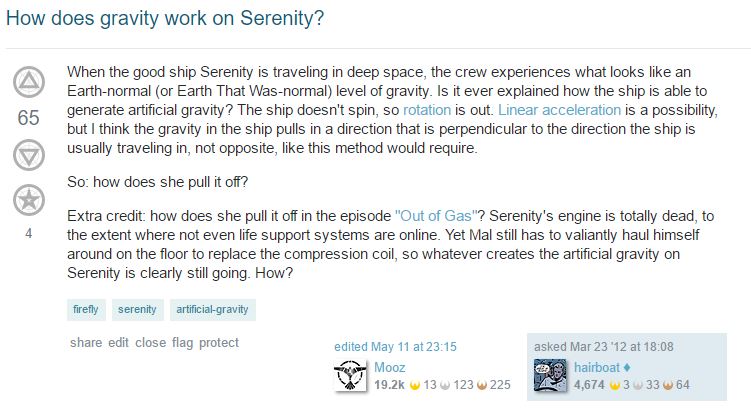Yes
I created the tag because there seemed to be some cases where a person was asking about the mechanics which artificially create or manipulate the gravity users face. This seemed to be more than just how users dealt with the natural force(s) of gravity.
Given that this is Sci-Fi, there is potentially a large application of this concept of artificial gravity.
Additionally, here's how Wikipedia defines gravity:
Gravity
Gravity, or gravitation, is a natural phenomenon by which all things with mass are brought toward (or gravitate toward) one another, including planets, stars and galaxies.
-Gravity, Wikipedia. [emphasis mine]
Whereas in science fiction the application seems to be more of a hitherto undefined mechanism by which gravity is produced, often using
- Rotational gravity
Whereby a ship or system is spun around on its axis, creating a centrifugal force, as in the movie Interstellar
- Field generators
Whereby some sort of machine or force is used to create or manipulate the gravity required to simulate Earth-like conditions
- Or others
Now let's score that sucka!
According to this post the tag would get the following score:
- Does is make sense to be an expert in artificial-gravity? Yes (+2)
Users may heave read or studied a fair bit about the applications of artificial gravity in science fiction. You also don't need to be an expert in any particular canon to be an expert in the field of artificial gravity. I.e. you don't need to be an expert in Star Wars or Star Trek to understand artificial gravity.
- Does it make sense of a question to be tagged only with artificial-gravity? Maybe (+1)
A question may be wanting to ask specifically about the workings of a particular artificial gravity system, however, in general this may be along side a certain canon or with story-identification. For example Which Sci-Fi work introduced the concept of "Artificial Gravity"? asks a "history of" type question and the accompanying history-of and science-fiction-genre tags are generic and could be done without.
- Does artificial-gravity have a single, universally-unambiguous meaning? Yes (+2)
This is a concept applied liberally in science fiction, especially any works which deal with space travel or spaceships. It is a simple and common "hand-waive" and is easily understood.
- Is artificial-gravity likely to be used correctly just based on its name? Yes (+2)
There is no other meaning to artificial gravity and the "artificial" part distinguishes it from "natural" gravity.
- Are there "enough" (> 15) but not "too many" (> 10% site-wide) questions that qualify for artificial-gravity? Yes (+2)
As you can see, I've already tagged 35 questions with the tag, however there's not likely to be greater than 50-60, given that there's only 271 questions with the word "gravity" in them.
- Are people like to use artificial-gravity to find questions to answer? Maybe) (+1)
I see this tag as more of a contextual tag, which serves to describe what you're looking at 'at a glance', not so much used on its own to find an answer. You possibly could, but you'd likely use it alongside a canon or story-identification.
For example, we can see below that the questions is immediately talking about the artificial gravity used on a space ship, 'at a glance':

- Are there likely some users who will favorite or ignore artificial-gravity? No (-1)
- Could artificial-gravity be reasonably used to feed questions to a specialized chat room? No (-1)
It's not generic or useful enough on its own for feeds.
- Can artificial-gravity be used to search for questions (for any reason) in a way that keyword searching cannot accomplish? Maybe (+1)
Although using the tag can help reduce the size of results if I'm looking for specific details of the concept in a canon, it doesn't add any significant benefit.
- Total: 9
Ok, that's a pretty low score, I mean it's not horrible, but it's not great either. But as I mentioned earlier, this tag is a 'descriptive' which helps to describe what the question is.
Gravity vs Artificial Gravity
It is true that in many cases the uses of gravity and artificial-gravity are interchangeable, however, with some proper definition and usage guidance, we can ensure that the correct one is used in each case.
For example, Let's have a look at:
In summary: I like it, it's not causing any harm as it's not confusing; leave it alone.

